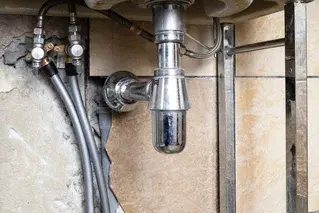Plumbing
Garbage Disposals and Septic Tanks: Can They Work Together?

Many homeowners wonder about garbage disposal septic system compatibility. Using a garbage disposal affects how septic tanks handle solid waste. This article explains if garbage disposals can safely work with septic systems and how to manage them properly.
Understanding Garbage Disposal Septic System Interactions
Septic tanks rely on a delicate balance of bacteria to break down solid waste. When you add a garbage disposal, it increases the volume of solids entering the tank. This rise in solids can strain the natural breakdown process and potentially cause issues.
How Garbage Disposals Affect Septic Systems
Garbage disposals grind food waste into small particles that enter the septic tank. This waste adds to the solid content, which bacteria must decompose. If solids accumulate too quickly, it can cause clogs or shorten the time between septic tank pumpings.
Igor Bystrika, a master plumber, explains:
“Garbage disposals can work with septic tanks but may require more frequent maintenance. With the right precautions, they operate effectively.”
Best Practices to Use Garbage Disposal with a Septic System
Proper use of a garbage disposal can reduce strain on your septic system. Follow these tips to maintain system health and avoid costly repairs.
- Limit Your Garbage Disposal Usage
Use the garbage disposal sparingly and only for small food scraps. Avoid overloading it with large amounts, which may overwhelm your septic system and cause blockages. - Avoid Problematic Food Waste
Don’t put fibrous foods like celery or corn husks into the disposal. Also, avoid starchy foods, grease, oils, and non-biodegradable materials. These can clog pipes or harm the bacterial balance. - Always Run Cold Water While Operating
Running cold water during disposal solidifies fats and oils. This practice helps prevent buildup in pipes and reduces the chance of clogs in your septic system. - Schedule More Frequent Septic Tank Pumping
Using a garbage disposal regularly means pumping your septic tank more often. Instead of every 3 to 5 years, expect to pump it once or twice a year. - Monitor Septic Tank Health Annually
Have a professional inspect your septic tank yearly. Monitoring sludge levels and the drain field ensures your system handles the extra solid waste safely. - Use a Sink Strainer to Catch Large Scraps
Install a sink strainer to catch large food scraps. Disposing of these scraps in the trash or compost reduces the load on your septic system. - Maintain Healthy Bacterial Balance
Septic systems depend on bacteria to break down waste. Avoid harsh household cleaners that kill beneficial bacteria. Use septic-safe cleaners and treatments to support your system’s health.
Choose a Garbage Disposal Made for Septic Systems
One of the best ways to protect your septic tank is to buy a garbage disposal designed specifically for septic systems. These models often include bacterial additives that help break down food waste efficiently.
Bystrika recommends: “Look for ‘septic-safe’ garbage disposals with bacterial additives. Pair these with a properly sized septic tank, usually at least 1,000 gallons, for best results.”
Alternatives to Using a Garbage Disposal with a Septic Tank
If you want to reduce septic system stress, consider composting your food waste. Composting keeps organic matter out of your septic tank and benefits your garden.
Composting: An Eco-Friendly Choice
Composting food scraps is a great alternative. It prevents extra waste from entering the septic system and produces nutrient-rich soil for plants. Plus, it reduces maintenance and repair costs for your septic system.
Conclusion: Managing Garbage Disposal Septic System Use
Garbage disposals and septic tanks can work together if used properly. Limit disposal use, avoid problematic foods, and maintain your septic tank regularly. For those concerned about maintenance costs, composting offers a smart alternative.
Explore more news and expert advice on this website to keep your home systems running smoothly.
